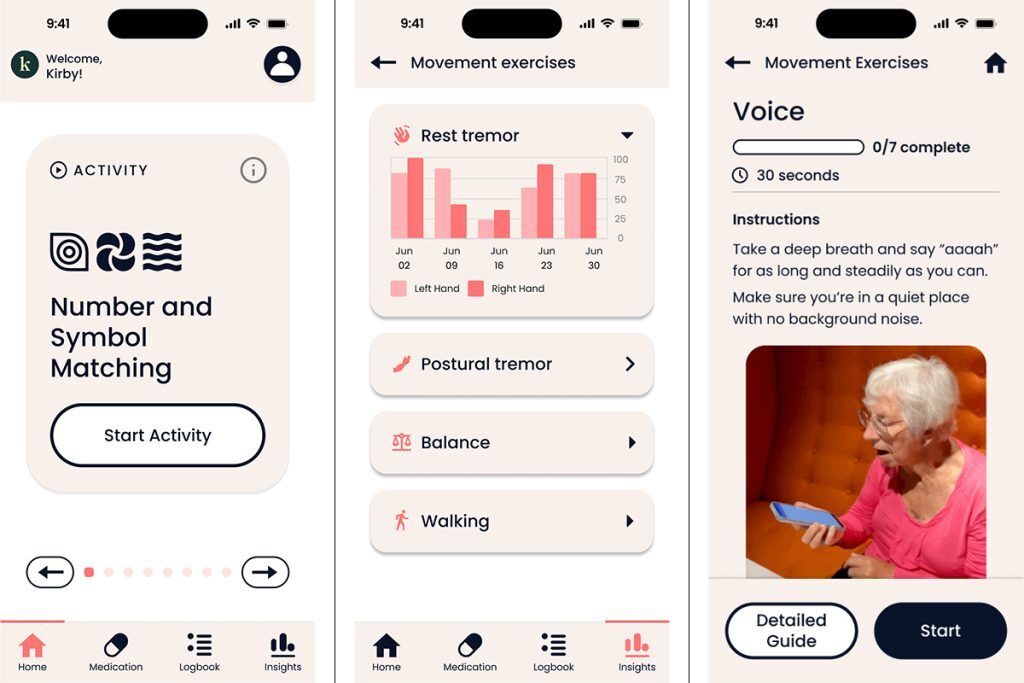AI-generated predictive biomarkers enable early detection and precision intervention in Parkinson’s and dementia.
British healthtech startup Kneu Health has raised $5.6 million in seed funding to advance its smartphone platform designed to detect and track neurodegenerative decline. Building on research conducted at Oxford University and validated in US and UK health systems, the London- and Oxford-based company’s approach centers on continuous monitoring rather than episodic assessment. Its FDA-cleared technology uses standard smartphones to measure motor, speech and cognitive function.
At the core of Kneu’s system are clinically trained AI models that analyze voice, movement and memory to produce predictive biomarkers of neurological change. These biomarkers help clinicians detect deterioration earlier, stratify patient risk across populations and precisely target interventions. The company’s dataset – reportedly one of the world’s largest for Parkinson’s and dementia – includes more than 500,000 digital measures from over 1,400 participants across pilot programs.
“Longitudinal data between visits is giving us a much richer view of neurological changes,” Kneu’s Chief Medical Officer Dr Kinan Muhammed told us. “For the first time, we can observe subtle shifts in movement or cognition as they start to happen, rather than after they begin to impact function. That kind of signal helps clinicians intervene earlier and tailor treatment with far greater precision.”

The rapid global rise of Parkinson’s and dementia case has created a care model that reacts to decline rather than anticipating it. Kneu’s platform aims to bridge that gap by offering continuous intelligence that gives clinicians a clearer view of change between appointments.
“Continuous insight transforms neurological care from a series of check-ins into an ongoing understanding of each patient’s condition,” Kneu’s CEO Caroline Cake told us. “That visibility enables clinicians to recognize change earlier, tailor interventions with greater precision, and ultimately reshape how we manage neurodegenerative conditions and care over time.”
Kneu claims that its early deployments suggest measurable benefits for both patients and providers. Clinicians using its system have reported faster access to treatment in two-thirds of cases and data-driven support for medication adjustments in more than half. Patients have described up to a 30% improvement in confidence, disease knowledge and self-management, which translates to greater independence and daily function.
In its pilots in the UK’s NHS, Kneu reports its platform demonstrated efficiency gains of 30%, reduced emergency admissions and allowed providers to shift Parkinson’s care from reactive to planned settings. The company is also expanding its presence in the US through initial contracts with Cedars-Sinai and Mass General Brigham.
The oversubscribed seed round was co-led by Oxford Science Enterprises and Cedars-Sinai, joined by Social Impact Enterprises, JIMCO, GK Goh Ventures and SXSW London. The investment brings total funding to $11.2 million and will support Kneu’s commercial expansion in the US, as well as scaling deployments for Parkinson’s disease, and advancing its dementia monitoring capabilities.
“Neurology has had plenty of algorithms,” said Oxford Science Enterprises’ Joel Schoppig. “What it has lacked is longitudinal signal that clinicians can trust and act on inside real workflows. Kneu has turned everyday phone interactions into a clinically governed measurement layer that scales across populations without new hardware or staffing.”


